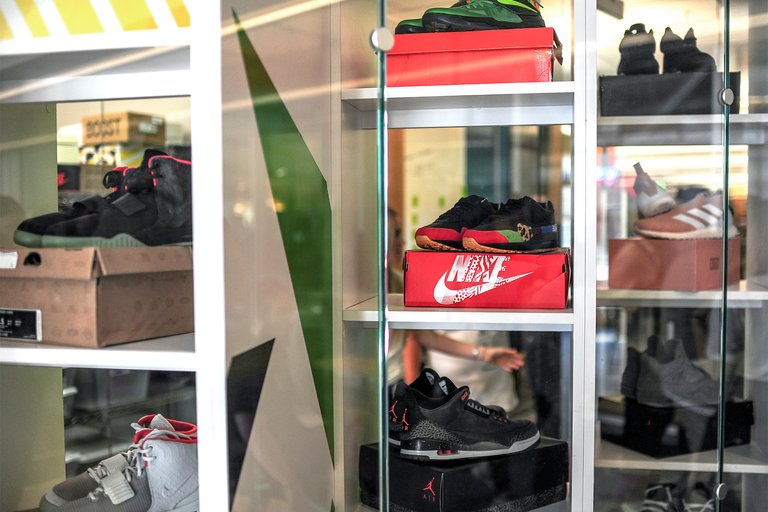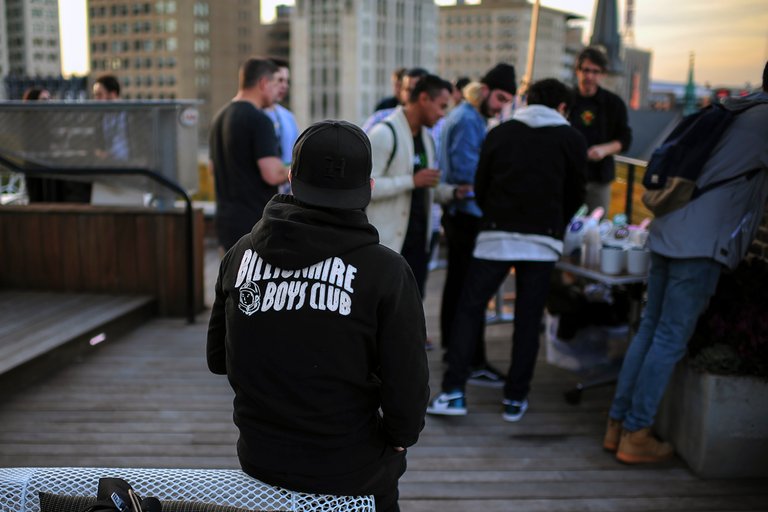

Buying a pair of new rare sneakers is harder than reselling them on StockX. To buy new, the Yeezy or Jordan gods have to smile upon you, giving you that winning raffle ticket at a local store or letting you beat the bots online. To resell, all you have to do is go to the StockX website and set a price. You don't take photos or haggle with potential buyers. Instead, you look at what price the shoes are selling for and list your pair at whatever amount you think someone will pay for them. Like a stock exchange, buyer and seller identities are kept from one another. StockX acts as a middleman, only releasing payment once it verifies that goods are authentic. It's this simplicity that has helped the company earn so many loyal users.StockX was founded in 2015 after Quicken Loans founder and CEO Dan Gilbert bought Campless -- an online repository for sneaker sales data -- from Josh Luber. As part of the purchase, Luber moved from his native Philadelphia to the Detroit metro area, taking up the mantle of StockX CEO and working from Gilbert's One Campus Martius building downtown. In a little under three years, the company has become the go-to source for buying rare high-end shoes and streetwear.
Last October, after countless requests from customers, the website offered resellers and industry insiders a peek behind the curtain at its first ever StockX Day in Detroit. It gave some 200 people a chance to see the internet made real, talk to employees, see how the authentication process works and convene in real life. It brought people like Kevin Tran, who first heard of StockX from a YouTube pre-roll ad. He's been using the site for about a year now, and between eBay and StockX, he can supplement his monthly income as a librarian by $1,500 on average. He thinks the selling fees are a little high but likes that StockX makes the process facile -- especially now that he can resell Supreme streetwear there.
The day of a drop, eBay will be flooded with listings selling a $50 T-shirt for $80 to $100. Simply as a matter of course, people are going to make a purchase from someone who has 14,000 reviews versus someone who has zero. "That's where StockX comes in and makes it that much easier for people to sell, whether you're the new guy or you're the 10-year vet of reselling," Tran said.
For others, StockX's trademark feature is that it guarantees authenticity.
"When it comes to selling a pair of Yeezys, people just have to trust the website," Jeff Caruana, a project manager at a Chicago-based tech company, told me. He uses StockX exclusively because of how easy it is, and as of last fall, he'd bought and sold 10 pair of shoes on the site. It can take years of selling on eBay to build a good reputation, especially when you're trying to sell sneakers that can cost as much as a month's rent. "The value that StockX adds is at the end of the day I know I'm buying legit shoes. I'm not necessarily sure StockX would have a business if it wasn't for all the fakes out there. People would just go to eBay or wherever else."
Veteran reseller Fred Preston agreed. "I can have all the great feedback in the world, but if I sell one pair of fake sneakers ... I'm going to be ruined, because now I'm known for selling fake merchandise," he said. After a few years of selling shoes online in his free time, Preston dropped out of college his junior year to make it his career.
Twelve years later, his Florida-based Nonfiction Store makes high six figures selling shoes and clothing online. He estimated that 15 percent of his business comes from selling on StockX. Around half still comes from eBay, with reselling platforms Goat and Kixify rounding it out. All told, he moves between 300 and 350 pairs of shoes per month. He likes StockX because he doesn't have to take pictures of everything he sells or write an item description. "It just makes everything simple."

The shoe market is incredibly volatile. Earlier last year, Nike flooded the market with Air Jordans and their values dropped precipitously, all but destroying the secondary market for certain models. Right now, the highest-value shoes are Yeezys from Adidas. During an extended question-and-answer session on StockX Day, a user asked Luber when the site would offer financing. Luber said the announcement was a few weeks away. "We're gonna run that credit line up!" the seller responded excitedly.
StockX is the last of the big shoe resellers online to start offering financing. Every transaction on the site is tied to a credit card or PayPal account in some way as it is. But now Luber and Co. are offering financing to their customers through Affirm, a "no gimmick" payment service headed by PayPal founder Max Levchin. For orders over $50, financing is available at checkout for anywhere between three months and a year. Interest rates range from 10 percent to 30 percent APR depending on your credit history, and in some cases a down payment may be required.
Some could look at a credit option from StockX as an investment opportunity and buy a dozen pair of Yeezys at $1,000 each. The dark side of this is that if Adidas wanted, it could pull a Nike and flood the market with Kanye West's signature shoe line. It'd leave resellers who bought on credit hoping to make a quick buck in a massive lurch. In a way, that already happened last year when Adidas released Yeezy football cleats. They were massively hyped at first, and then the price dropped to the ground because, well, they're football cleats.
"The Yeezy cleats were terrible," Tran recalled. After the shoes didn't move, people started using the upper material for custom pieces just so they could make some money back. Tran said that most of the time, buying something with Kanye's name on it is a good gamble, but as with any investment, you have to take a calculated risk. "I think [credit] is going to change the game, maybe not in the best way," Tran said.
While the audience was enthusiastic about the news, when I asked Luber about it after the room cleared, he didn't seem excited by the prospect.
After all, StockX distinguishes itself from other resellers through an unwavering commitment to the buyers and sellers. That alone has built an incredibly loyal customer base. StockX will do practically anything to keep its customers happy, whether that's sending discount codes in case a pair of shoes ships without a verification tag or guaranteeing that every shoe sold through the site is 100 percent authentic. Sure, you can argue that you shouldn't invest money you can't afford to lose, but 19-year-olds aren't necessarily going to be the ones buying shares in Apple or GE. They will drop serious coin on sneakers or a high-end T-shirt though.
"It's the same thing as giving a college freshman a credit card," one sneaker industry veteran who wished to remain anonymous said. "They're not gonna know what to do with it. They're gonna mess their credit up for the rest of their life."
Luber said he feels a responsibility to make sure kids aren't going into crippling amounts of debt over sneakers. As he spoke, his face took on a pensive look, playing out in real time the classic startup conundrum of making decisions that are good for business rather than those that make you feel good. After a pause, he added that at the end of the day, StockX isn't a financial adviser. "We debated this for a really long time," he said. "And one of the concerns was that, but honestly, we're the last people in the sneaker industry [to offer credit]. We can't not have the same features that our competitors have."
The industry veteran said that financing is just a part of retail at this point and that it could ultimately be a boon for StockX and help it hit a customer who can't quite drop $4,000 on a red faux fur bomber jacket from Supreme. The source likened it to buying a $10,000 Rolex on credit from a jewelry store. "That watch may cost you $15,000 after all is said and done, but if that's how you wanna do it, so be it."

The market for counterfeit and pirated goods amounts to half a trillion dollars per year. Counterfeiters, however, aren't just selling fake Coach purses and Rolexes in an alley anymore. The internet makes for a quick way to sell unauthorized reproductions of just about anything you can think of, including rare sneakers and streetwear.Knock-offs aren't easy to spot. The fake makers have gotten so good that reproductions are said to be 95 percent accurate. There are minor variations in materials, screen printing, sole pattern and stitching, but to the untrained eye they'll pass for the real deal. Knowingly buying a clone is totally up to you. The problem comes when unscrupulous sellers try passing off fakes as the real thing.

At the end of the verification process, each product gets an "authentic" tag, StockX's guarantee that goods aren't counterfeit.

Although it was called StockX Day, only about 40 percent of it was actually about sneakers. The rest was walking through Gilbert's various properties and sitting through his (now-failed) pitch for Detroit to be the site of Amazon's second headquarters. Throughout, the tour guides who showed us around Gilbert's myriad downtown investments told the crowds that StockX was adding nine jobs per week, with guides giving out their contact info each time.It happened with each group. During my tour, two of the guides got into a playful argument over who people should send their resumés to. StockX is expanding, and what better way to organically grow the company than to invite more than 150 users on their own dime to get a look behind the curtain? Representatives admitted there were a few paid influencers at the event that day, but of the handful of people I spoke with, everyone covered their own travel and lodging.
Posted from my blog with SteemPress : http://moorishharem.com/why-sneaker-heads-are-leaving-ebay-for-detroit-startup-stockx/
Hi! I am a robot. I just upvoted you! I found similar content that readers might be interested in:
https://www.engadget.com/2018/02/16/stockx-day-detroit-sneaker-reselling-josh-luber/